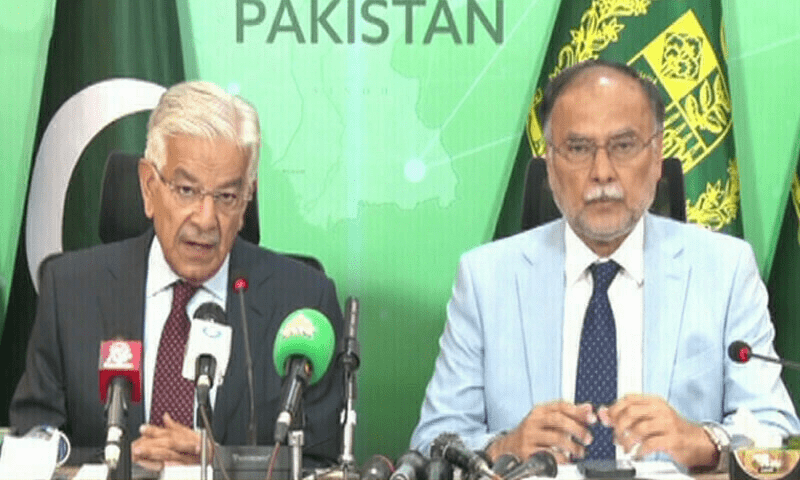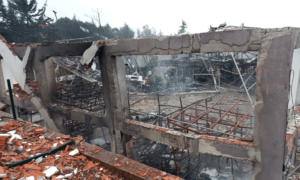• Khawaja Asif says state won’t allow anyone to issue edicts inciting violence; Tarar says no space for hate
• Ahsan compares hateful remarks to open rebellion against Constitution, promises probe to nip this in bud
• CII chief says against principles of Sharia to declare a person liable for death; PBC denounces hateful propaganda
ISLAMABAD: After members of a politico-religious outfit attempted to incite people to violence against the country’s chief justice, the federal government on Monday said it would use the full force of law to bring the culprits, including the Tehreek-i-Labbaik Pakistan (TLP) deputy chief, to justice.
The threats to the top judge came as the TLP held a series of gatherings last week in various parts of the country against the Supreme Court’s verdict in the Mubarak Sani case, which was recently reviewed by the apex court in light of a plea filed by the Punjab government.
During the protest outside the Lahore Press Club last week, TLP leader Pir Zaheerul Hasan Shah attempted to incite people to violence against CJP Qazi Faez Isa.
This was, however, unanimously denounced by government ministers, the apex bar council, as well as the Council of Islamic Ideology.
In a joint press conference, Defence Minister Khawaja Asif and Planning Minister Ahsan Iqbal condemned the remarks of the TLP leader and said elements with “vested political interests” were “spreading blood and violence” in the name of religion.
“The state will take action against this because things being said about Qazi sahab are based on lies and he has been targeted through different tactics for the last few years,” Khawaja Asif said. “The state will not allow you to issue a fatwa (decree) to kill someone. If we allow this, the writ of the state will crumble,” he added.
He said no group could incite violence in the name of faith or politics. “We will use the full force of the law to bring them to justice as the state will not accept dictation by any group”.
Speaking on the occasion, Ahsan Iqbal said inciting violence against the chief justice was an “open rebellion against Pakistan’s Constitution”.
Referring to a 2018 assassination attempt on him, the minister said he had also been a target of “these people”, calling the attack on him a “political act to eliminate the PML-N’s leadership by weaponising the finality of prophethood”.
“Pakistan has a Constitution, laws, and court, and no individual or group has the right to issue decrees. Only our courts have the authority to judge and punish,” he added.
The minister warned that if such groups were allowed to continue issuing such decrees, then the country would be “bathed in fire and blood”. “People commit these acts to prop themselves up politically, but they only harm religion and the image of our state.” “Not only will we condemn this, but we will launch an investigation into this so it never happens again,” he added.
Separately, addressing a joint news conference with clerics in Rawalpindi, Information Minister Attaullah Tarar strongly condemned the remarks against the top judge and vowed to deal with the issue with an iron fist. He said there was “no space in our society” for such inciting remarks.
CII, PBC reject ‘edicts’
The Council of Islamic Ideology (CII) stated that declaring a person liable to death was against Sharia as well as the law of the land. In a statement, CII Chairman Dr Raghib Hussain Naeemi said it was against the principles of Sharia for any individual to declare that any person was liable to or deserves death.
He emphasised that such emotional actions harmed the cause of the finality of prophethood and added that the CII had repeatedly stressed that incitement, declarations of apostasy, and threats to government, state officials, or ordinary citizens contradict the clear teachings of the Holy Quran and Sunnah. The CII chairman said if anyone disagreed with the recent Supreme Court verdict, they could discuss it in an intellectual manner.
He said that in the 212th meeting of the CII held on Nov 27, 2018, the council had resolved that the practice of issuing edicts of apostasy and declaring individuals as deserving of death was not aligned with Islamic principles.
“In an Islamic state like Pakistan, no one is allowed to pass judgements on others’ beliefs and religion based on personal interpretations and issue edicts for their death. This matter requires utmost caution and careful handling,” he maintained.
PBC denounces violence
PBC vice chairman Riazat Ali Sahar said it has been clearly mentioned in the Supreme Court’s July 24 judgement that no one can be Muslim if he or she does not have unqualified belief in the finality of the prophethood. It has also been clearly mentioned in the judgement that the groups who call themselves Ahmadis are non-Muslim in the eyes of Sharia, constitution and law, a PBC press release quoted him as saying.
Mr Sahar pointed out that previous verdicts of the Federal Shariat Court and the Supreme Court have been adhered to in the apex court’s July 24 judgement. He regretted that some elements were interpreting the judgement according to their whims and trying to incite the masses with their hateful propaganda against the CJP, which was not allowed by Islam.
Published in Dawn, July 30th, 2024







